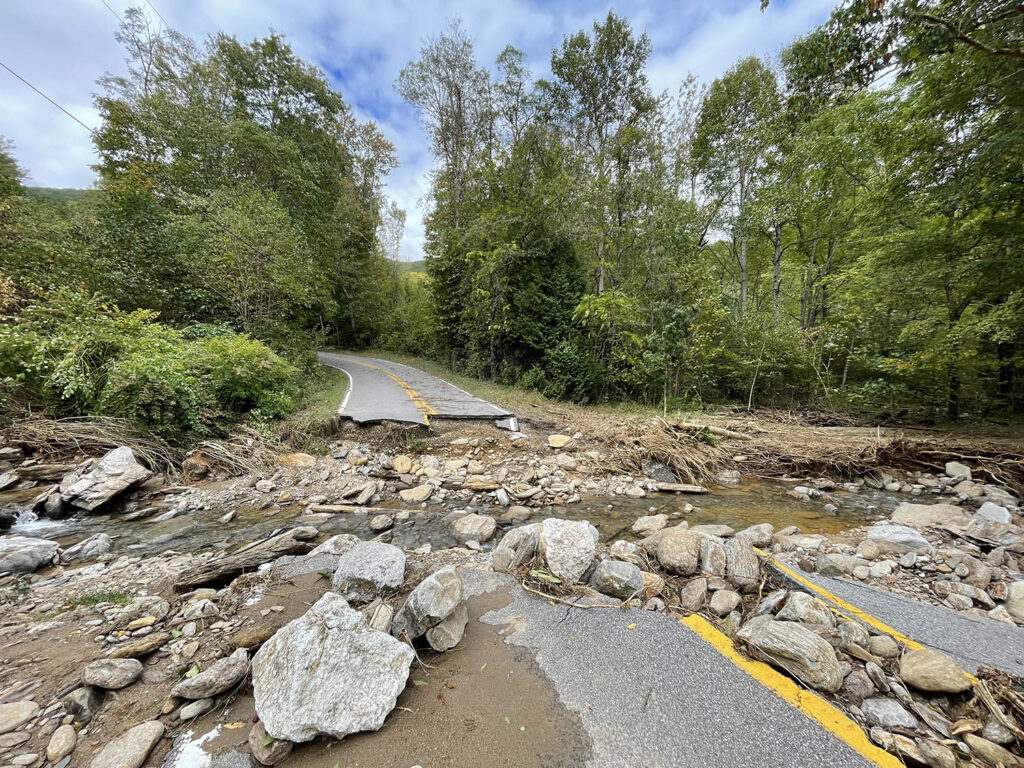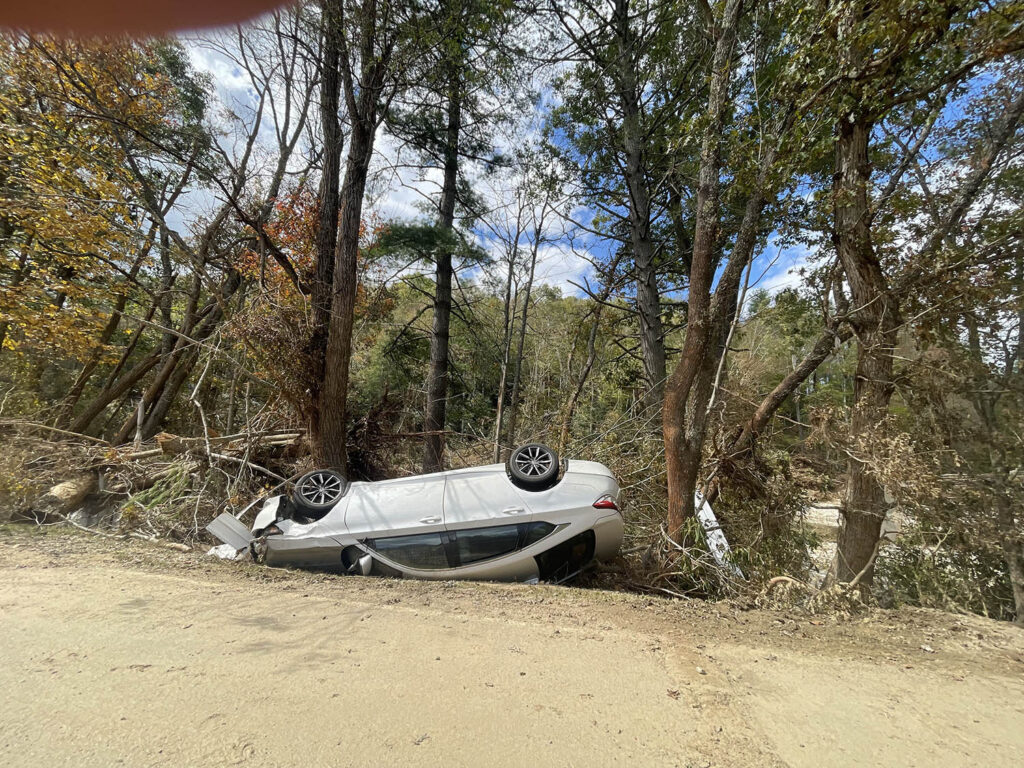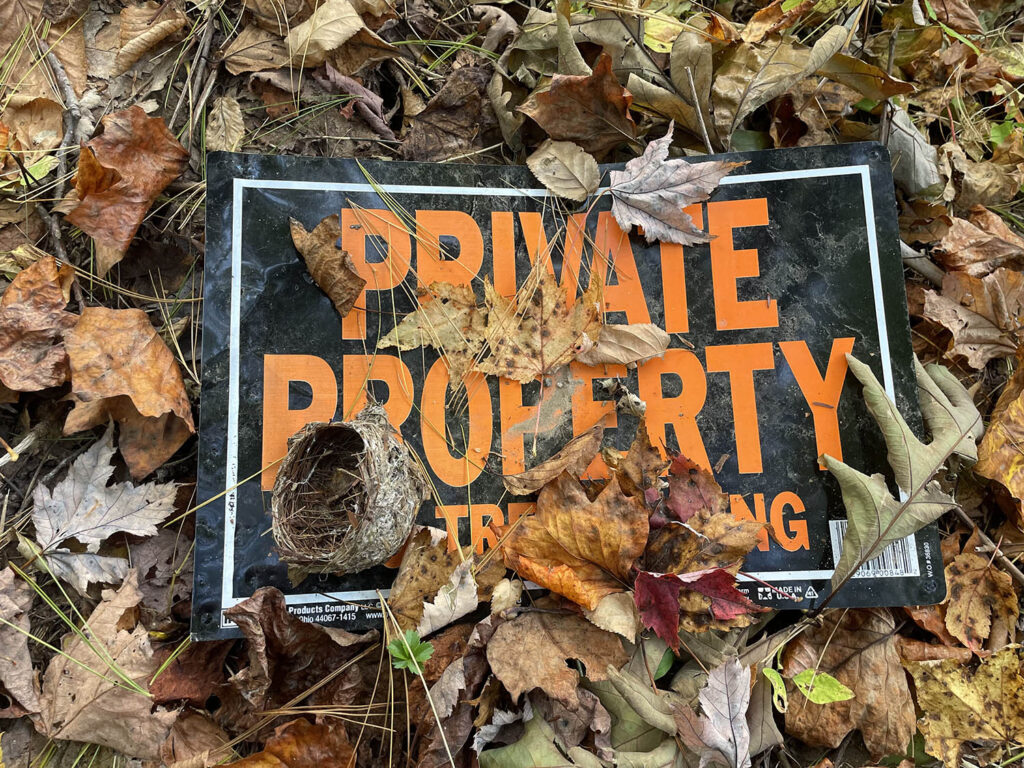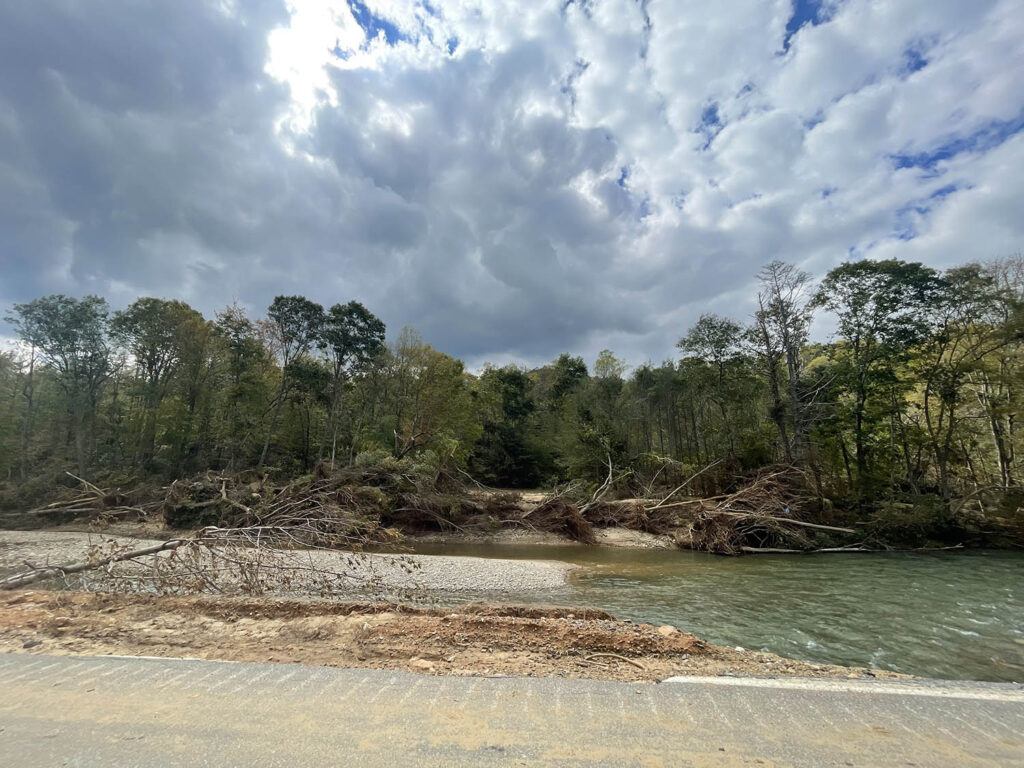“The biggest gift you can give is to be absolutely present, and when you’re worrying about whether you’re hopeful or hopeless or pessimistic or optimistic, who cares? The main thing is that you’re showing up, that you’re here and that you’re finding ever more capacity to love this world because it will not be healed without that. That was what is going to unleash our intelligence and our ingenuity and our solidarity for the healing of our world.”
—Joanna Macy
The hurricane changed me more than I realized. Returning from evacuation three days after Hurricane Helene tore through Western North Carolina, I’ll never forget the silence, the emptiness, the shock. Crumbling roads, cars wrapped around electric poles, entire buildings simply gone, only cement foundations remaining; during that first week, people wandered down roads to homes rendered inaccessible by vehicles, handing out water bottles and food, all of us asking each other, sincerely, “Are… are you alright? Do you need anything?”
Stories of the missing, families swept off their roofs, mountainsides covering entire communities circulated daily as we tried to make sense of what it means to live as the people on the news.
From where I sit, nearly a year out, it feels more like a dream. Life has returned to a kind of normal—roads are repaired, businesses and traffic and all the rest of the machine buzzes along, almost like it was. But the fragility of our human condition is plainly visible now—the plethora of campers where homes once stood, two-story piles of debris being processed by tractors and woodchippers in fields along the highway; caved in roofs, slate grey foundations, sink holes, and the remade geographies of rivers that seemed so certain.
The reminders are everywhere, and coming again into hurricane season leaves my body tentative and tight. It can happen so quickly. I can’t unknow now how easily my defenses against reality can be pierced by forces so much larger. I can’t unknow that this will happen again.

It was a strange twist of my personal fate to be a month into my practicum as a Clinical Mental Health Counseling student when Helene hit, as I’ve been obsessively studying collapse and climate for a decade. Going back to school to get my MA was a choice rooted in knowing that there will be a great need for collapse-aware therapists to support people through what Joanna Macy calls The Great Unraveling as the veil of normalcy cracks with increasing frequency and force.
After Helene hit, we had two weeks off of school, and we should have had more. By the time I went back, there was still no electricity, cell service, or internet at my house. Some of us had obtained Starlinks, but mostly it was candlelit dinners and moment-to-moment response. During those two weeks, time was dilated, like a psychedelic journey. With no machine world to enforce the urgent rhythms of business-as-usual, the psyche begins to widen. Within my immediate community of 10-15 people, it felt like psychological breakdown popcorn. One day it was Justin’s turn, then Jackie’s, then Kearsley’s, then mine. Wave after wave of unprocessed pain rose into my mind—griefs of relationships and conversations past, fears I’d been carrying for years, unmet needs. Patiently, we sat with each other over wine and deer meat, processing, listening, hugging.
The first day back in class confronted me with the absurdity of abstraction that defines our dying paradigm. The class was Psychological Testing and Assessment. Lots of statistics, how to score marks on a piece of paper and deliver potentially life changing diagnoses to people, neat little boxes for complex human lives. I’ll never forget the looks on my classmates’ faces as we stared up slack-jawed at the PowerPoint presentation at the front of the classroom, wondering how any of this mattered to anything.
As a practicum student, I had four clients. Sitting down across from them, taking the first deep breath together, it felt like years had passed. What to say in a moment like that? In each session, our eyes met in a new way, something vital broken open, making contact beneath the usual masks of counselor and client. A lot of my work that first week was just sitting and being with people who watched their neighbor’s houses float away, who, like me, had been swimming in the flood waters of broken homes and communities and futures. We cried together, immobilized by the scale of the disaster and our utter lack of control. Each person’s story of the storm brought me back to my own, widening my understanding of the magnitude, amplified by my understanding of collapse.

As I write from my packed-up office, it is my very last day of my MA in the Clinical Mental Health Program. Apparently, I am now officially a mental health professional. We are nearly a year removed from the rupture of Hurricane Helene, and six months into the rupture of the illusion of American democracy. I seek to write this while it’s fresh, while my mind still swirls with theories and rules and frameworks and “tools”. The phrase “evidence-based” is sacrosanct in the psychology field. Evidence, as proven by theories, as proven by testing, as proven by repeatability. Never mind that human subjectivity and consciousness itself remains an unsolvable mystery, never mind that “normal” is defined by a big blue book that speaks in codes and pathologies, never mind that it can all just come apart when it rains.
Throughout this grueling program, particularly after Helene, I have often wondered what the point of all this work is. I don’t need evidence of collapse anymore. It is everywhere I look; in the broken gaze of commuters, in the vacuous machinations of the airport, in the fearful flailings of the surveillance state, in the stories I sit across from everyday in my office. Deep down, nobody believes in this anymore, and none of the charts, books, or theories I’ve spent the past two years imbibing are edible.
And yet our lives are destined to play out within the clutching desperation of a machine that doesn’t want to die. The individualistic materialist paradigm, the reductionist medical model, the bandwidths of “normal human behavior” as defined by a single book, these will continue to define the ways that care is or is not provided to people whose struggles are mostly because of this very system. Audre Lorde’s famous quote, “the master’s tools will never dismantle the master’s house” rings in my ears—within the system, these are the tools I am asked to use to try to support my clients in rebuilding a semi-functional shack within the strip mall of apocalyptic postmodernism.
What does it mean, really, to be an ethical counselor, now? This is the question that haunts me as I finish writing up my clinical notes.
“Client discussed ongoing turbulence in employment experience and difficulty meeting workload and personal expenses, considering burnout. Affect appeared distressed and agitated. Client expressed grief, crying while speaking, posture hunched and withdrawn. Counselor utilized CBT/reframing, solutions-focused interventions, and person-centered counseling to support client in considering solutions.”
Reframing. Solutions-focused. Cognitive Behavioral. Band-aids on arterial wounds, all of them. “Reflections of meaning, paraphrasing, open and closed-ended questions, immediacy”—these are the tools we’re taught to “be with” our clients. And they work well within the bounds of business-as-usual because most people don’t have a single present, safe human in their lives who will simply be with them in their challenges. These tools I’ve spent thousands of dollars and multiple years attaining are the inherent competencies of human presence that we’ve long forgotten in the fever of “progress;” the way our psyches naturally exist when our basic needs are met.
In my experience, healing is a product of meaning. Not meaning in the Existential Therapy sense, which implies that we just “make up our own.” But meaning in the visceral, somatic, intuitive sense, the kind that arises of the living moment from the bandwidths of consciousness that mainstream psychology tries its best to deny: Meaning with a capital M, that flowing river of Dao, the ordering principle of the universe telling a story through time that our little lives are invited to participate in.
Healing does not come from trying to bring the dead back to life, nor from trying to stop what is inevitable. There is no healing in trying to craft a better ego or to become more “normal” amidst a context of poisonous conformity. As mental health professionals, we do not honestly serve our clients by colluding in denial of the truth of collapse, or by encouraging them to seek only personal solutions to the unsolvable predicaments of modernity. For real healing, there has to be something more, something deeper, something communal. If our treatment is only aligned with the individualist reductionist model, we are unwittingly contributing to destruction.

We have to stop pretending that we’re not collapsing. There is no Meaning in feeding our lifeforce to a dying machine that proves itself increasingly unlivable and unjust. There is no way of encountering the healing reservoir of Love by struggling against the current of what is, just as building a house in a floodplain, no matter how sturdy, makes no sense amidst a context of runaway climate change.
The real work of healing manifests when we run out of options, when the progress machine or our personal machine breaks down, or we have the good fortune of temporarily pressing pause. This is when all our fighting gives way to Truth.
Rock bottom is not considered an “evidence-based” stage in the treatment of addiction. It won’t show up in the DSM-5-TR, and no insurance company will reimburse me if I write it in my notes. And yet we all know, intuitively, that this is often what it takes for an addict to turn the corner. Rock bottom, ultimately, is nothing more than finally making contact with Reality.
I want to finish by telling you about the silence in the days just after the hurricane. Imagine it—debris strewn, urgent daily meetings, wails of grief and prayerful singing, helicopters flying occasionally overhead. And between it all, louder than I’ve ever known it, the stillness of reality shorn of noise. Each step along the trail behind my woodland house on my morning walks crunched with clarity in those two weeks, echoing with emptiness. Each contact with another person opened my heart because of my contact with inherent vulnerability. For a brief window in time, there were no strangers. There was no turning away from it, from myself, from others, from life. Nothing to distract from what’s always right here, waiting patiently.
That silence is our destiny, the ultimate destination of every movement, and where the next turning of our story, after this noisy arrogant machine eats itself, will arise from. Whatever comes next is already bubbling in our deepest longings, in the world we know, from the center of our hearts, is possible. Therapy, whatever that means now, must make space for this collective rock bottom so that we and our clients can listen for our true places in the story to be.
















“Audre Lorde’s famous quote, ‘the master’s tools will never dismantle the master’s house,'” is a good quote. I’m glad the younger psychologists/couselors are garnering insight into the fact that the “master” is not the psychiatrists, and their “BS” DSM, nor yourselves. God save us all.
Report comment
It was heart-warming to read this (as a psychologist on the other side of the world) since it sounds like the US certainly needs more mental health professionals like you. Best of luck with your work.
Report comment
When I saw the lead photograph, I thought: “I’ve been there, that’s familiar”. It is and I was. Too, like you. Thank you for sharing all of this. I lost alot there. And left most of it behind. I had been planning to move away for at least a year. It was easy to see the quickening of climate change over the past 20 years I lived there. I studied the weather patterns daily, having lived for years with a hay farmer. Who knew that would be the part of the relationship that helped me survive? I was startled into my own awareness when the tree fell on my powerline: my time there was done. Even before the floods. Well before the fire that sealed my determination and destiny
.
I learned to leave from my begining. The chaos and terror of the home I was hurled into made escape a learned reality from the outset. Somehow, I was born knowing that there had to be a better way of living in this beautiful planet. Yes, I found beauty & an environment with a lower cost of living. But I took my secret with me here: a loving heart. And I keep trying it out: offering it up to ones who know me well and others I’ve just met.I caress the stones on the shores of Lake Michigan again. But, on ‘the other side’. Now I know: I’m one of the lucky ones.
Report comment
Yes in Asheville, Vanguard had purportedly secured the rare earth mineral rights to the surrounding area prior to the flood. We should now consider cloud seeding and chem-trailing a tool of the master; even while he does this in the name of global warming. I do find it hopeful that in the long course of earth history, hominids have survived for epochs in both warmer and colder climates.
Report comment
Most beautiful piece of writing in every way, thank you.
What is it to be “absolutely present,” and, when we are, what can we not heal, and how, please?
Peace.
Tom.
“On and on the rain will fall
Like tears from a star
Like tears from a star
On and on the rain will say
How fragile we are
How fragile we are” – Sting, “Fragile.”
Report comment
Absolutely beautiful writing of truth. I am laying here in the middle of the night reading, searching again for help for by beloved son. Your conclusion is so true in perhaps every aspect of human trouble. You verify for me my conclusion. The time and energy spent in medication trials, etc. etc. etc. for 14 years in trying to help my son has led to nothing but false hope and turmoil.
Love and hope in God, like an anchor for our soul, is our only answer to the continuous foretold troubling events unfolding on earth now. We cannot leave out that knowledge in our search of why and who only has the power to remedy this overwhelming catalytic mess on this most awesome earth. Your conclusion about the possible necessity of hitting rock bottom for others to wake up and understand our vulnerability and the greatest importance of love, unity, empathy and compassion for each other is true. Always. My son’s empathetic, beautiful and complex mind and thoughts about the troubles he sees here on earth cannot be simply diagnosed and given a code and medicine to fix. He needs to know that he has the power to help others compassionately as he is reasonably able to, but it is our great God that will be the one that will be setting straight and restoring what His original purpose was for His beloved creation. Humans do not have that power, no matter how much man believes he does. It is terribly bad, yes, like terror, when no one in the mental health system could simply support him in his beliefs instead of labeling and constantly trying to medicate him leading to more and more delusion and angst. Anyway, thanks. I realize my thoughts stray some from your point, but much of it, less God, is excellent and helps me see that we are not alone in our none-for-the-better experiences with accessing mental health care.
Report comment
Burn-out is not unique to physicians, therapists, counselors or to would-be healers of any kind, in my opinion, but is something we all do as human beings who have all “come here” to help one another to heal.
I found it tremendously enlightening to research how various European countries have had different attitudes to what “burn-out,” “physician burn-out,” “workplace burn-out” might be, if it exists, while ICD’s and DSM’s seem embarrassed by it.
Jesus, himself, seemingly burned out repeatedly- and ultimately disastrously – why should we not all burn out by trying too hard, or be embarrassed to have done so?
Perhaps because we can all learn not to, eventually?
The Canaanite Woman Matthew 15:21-28 https://share.google/l5q5AJesSW8hyQcMt
Luke 4:14-30 NIV – Jesus Rejected at Nazareth – Jesus – Bible Gateway https://share.google/mm9Ryvcr3CSn8r15Z
Much love.
Heartfelt thanks to Kristopher and to MIA for most superb essay and photographs!
Tom.
“If only I knew then what I still don’t know…!”
Report comment
Thank you so much for this balm of reality. The great unravelling, as I learned it from Joanna many years ago, is impossible to hold as a single individual outside of a community of those who are willing to surrender to this. What does it mean to “abandon all hope” in order to love Life more fully? I am an old woman, still practising as an Integrative Psychotherapist in Nova Scotia. Sometimes the isolation and loneliness seems unbearable, until I remember that allowing myself to experience the despair does not mean giving into it, but rather serves as a reminder to experience/accept reality and love more fiercely because of it. Thank you for the reminder that that we are part of the same web … for today.
Report comment